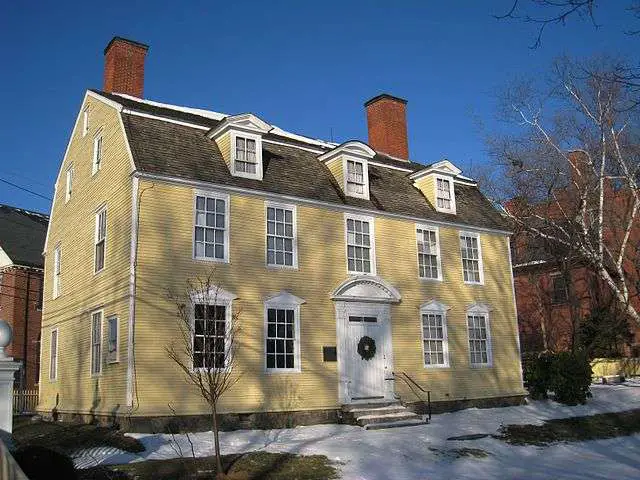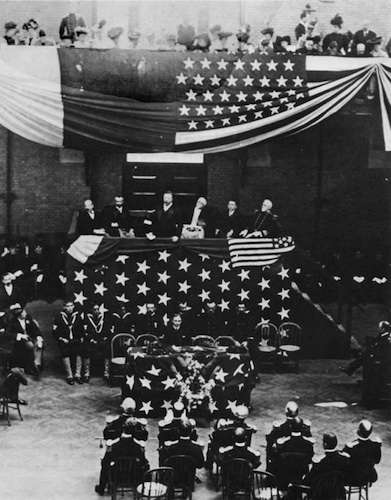The relentless self-promoter John Paul Jones would have loved his splendid second funeral at the U.S. Naval Academy, with President Theodore Roosevelt reading the keynote address before a large assembly of dignitaries.
His first one, not so much.
He died in obscurity in Paris, France, and his few friends buried him in a cemetery that turned into a dump.
John Paul Jones, Fighter
Born John Paul near Kirkbean, Scotland, on July 6, 1747, he later added Jones. He went to sea at 13, eventually finding his way to America. During the American Revolution he fought for his adopted country in the Continental Navy.
He led daring raids against British warships and forts along the British coast. Once, he sailed to Scotland to abduct the earl of Selkrk so he could exchange him for patriot prisoners. He didn’t find the earl, but he stole all his silver, including his wife’s teapot with her breakfast tea still in it.

John Paul Jones by Charles Wilson Peale
As commander of the Bonhomme Richard, Jones uttered his most famous words in the battle with the HMS Serapis. When the Bonhomme Richard began taking on water and fires broke out on board, the British commander asked Jones to surrender. Jones replied, “I have not yet begun to fight!”
The British captain surrendered his ship.
Officers and Gentlemen
Jones not only had a brilliant fighting career, but he promoted professional naval standards. Midshipmen today still must memorize his pronouncements on the requirements of a naval officer:
None other than a Gentleman, as well as a seaman, both in theory and practice is qualified to support the character of a Commissioned Officer in the Navy, nor is any man fit to command a Ship of War who is not also capable of communicating his Ideas on Paper in Language that becomes his Rank.
Jones lived in Portsmouth, N.H., twice: for five months in 1777 as he awaited the outfitting of the USS Ranger; and from 1781-82 while awaiting the construction of the naval ship USS America. He said he spent the happiest times of his life in Paris and Portsmouth.

John Paul Jones House
He suffered a blow to his career, though, when he didn’t win command the USS America. Instead, Congress gave it to the French to make up for a warship grounded in Boston Harbor.
Sad Ending
After the war, Jones fought with the Russian Navy. He moved to France in 1790, where he sank into anonymity.
He died in Paris on July 18, 1792, only 45 years old. His body was wrapped in a winding cloth, preserved in alcohol and placed in a lead coffin donated by a French admirer. A dreary funeral procession of servants and a few friends carried his remains to the St. Louis Cemetery for Alien Protestants. The cemetery was later used for animal fights and as a dumping ground for dead animals.
In 1905, the U.S. Ambassador to France, Horace Porter, discovered John Paul Jones’ grave after a six-year search. His casket was opened, and John Paul Jones’ face was still recognizable.
American warships brought Jones’ body to Annapolis, Md., for interment in U.S. Naval Academy chapel. Then on April 24, 1906, his flag-draped casket was taken to Dahlgren Hall, where President Theodore Roosevelt delivered the eulogy. Roosevelt, an ardent admirer of Jones, wanted to create a great U.S. naval fleet. Said Roosevelt at the ceremony:
Every officer . . . should feel in each fiber of his being an eager desire to emulate the energy, the professional capacity, the indomitable determination and dauntless scorn of death which marked John Paul Jones above all his fellows.
Jones was placed under the grand staircase leading to Memorial Hall. The casket remained there for 13 years until reinterred in a crypt in the chapel on January 26, 1913.
The John Paul Jones House in Portsmouth, N.H., is now a museum.
This story was updated in 2024.
Images: John Paul Jones House By Daderot – Own work, Public Domain, https://commons.wikimedia.org/w/index.php?curid=5643831.


4 comments
Remarkable!
[…] books were extremely popular. Among her readers was Teddy Roosevelt. Roosevelt took an interest in the case and bought Rinehart’s version of events. He lobbied President […]
[…] on the later exploits of John Paul Jones and the Ranger, Abigail Adams wrote on Dec. 13, 1779, “Unhappy for us that we had not such a […]
[…] Herman Melville then picked up the story and wrote a fictionalized version of it, adding encounters with Ethan Allen and John Paul Jones. […]
Comments are closed.